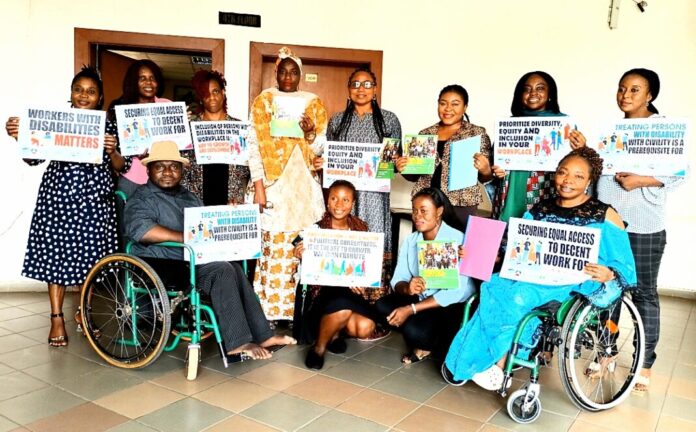In a significant stride towards enhancing disability rights and gender inclusion in Nigeria, the Solidarity Center West Africa organized a virtual landmark training session focusing on the implementation of the Disability Act and the critical intersection between disability and gender. Held on Wednesday, May 29, 2024, this event brought together key stakeholders from various sectors to address and strategize on these pressing issues.
Janet Anaele, Program Officer at Solidarity Center West Africa, set the tone in her opening remarks. She highlighted the primary objective of the meeting: to examine the implementation of the Discrimination against Persons With Disabilities (Prohibition) Act, 2018, particularly through the lens of gender. “This is one of the issues raised from our research report on ‘Securing Equal Access To Decent Work in Nigeria: A Report by Workers with Disabilities’,” Anaele noted.
Barriers Facing Women and Girls with Disabilities
Susan Kelechi, a disability and gender inclusion expert, delivered a compelling presentation on the intersection of disability and gender, identifying several significant barriers affecting women and girls with disabilities. She emphasized the pervasive social and cultural stereotypes that see these women as dependent, asexual, and incapable. “These stereotypes lead to significant social exclusion, including challenges in forming relationships and getting married,” Kelechi explained.
Kelechi also highlighted the issue of double discrimination, where women with disabilities face bias not only because of their disability but also due to their gender. She pointed out the severe lack of healthcare services, where negative attitudes from health practitioners and inadequate policy implementation deny women with disabilities access to essential services like sexual and reproductive health, maternal health, and family planning.
Economic inequality was another critical issue raised. Kelechi detailed how inaccessible public infrastructure and a lack of reasonable accommodations limit employment opportunities for women with disabilities. She also called for social security allowances to offset the additional costs associated with disabilities, emphasizing the need to address income disparity.
Education was another area of concern. “Inclusive education policies are not being adequately implemented, which prevents women with disabilities from acquiring the education necessary to improve their lives,” Kelechi stated. She also touched on the heightened vulnerability to violence and abuse that women with disabilities face, exacerbated by societal attitudes that often disbelieve their experiences and the inaccessibility of legal and support systems.
Calls for Action and Better Implementation
Kelechi urged participants to become champions for disability rights and increase advocacy efforts. “We must address these issues through existing policies and ensure they are effectively implemented,” she concluded.
In a subsequent session, Moses Oluwaseyi, a disability inclusion expert, focused on reporting and compensation for non-compliance with the Disability Act. He referenced several international treaties Nigeria is a signatory to, such as the UN Convention on the Rights of Persons with Disabilities (UNCRPD) and the Protocol to the African Charter on the Rights of Persons with Disabilities. “These are critical instruments to hold both state and non-state actors accountable,” Oluwaseyi asserted.
Oluwaseyi provided a comprehensive overview of the Disability Act, which was passed in 2018 and assented to in 2019. He detailed its ten parts and 58 sections, explaining the rights and reporting mechanisms available to individuals and organizations. He also discussed the penalties for non-compliance, arguing that they are currently too weak and need to be reviewed to ensure better enforcement.
Emphasizing the Role of Businesses
Janet Anaele also highlighted the International Labour Organization’s Violence and Harassment Convention, 2019 (No. 190), during her session. She noted the importance of creating a work environment free from violence and harassment, particularly for women with disabilities, who are often disproportionately affected. “The Solidarity Center recognizes that violence and harassment in the workplace prevent women with disabilities from accessing and advancing their opportunities in the labor market,” Anaele said.
She called for increased awareness and advocacy on ILO C190, emphasizing its importance in guaranteeing decent work for women with disabilities. “Members have an important responsibility to promote a general environment of zero tolerance to violence and harassment,” she added.
Moving Forward with Unified Efforts
The event concluded with a call to action from all stakeholders present. Participants unanimously agreed to escalate the issues raised within their respective organizations and work collaboratively to ensure the effective implementation of the Disability Act. “We must stop working in silos and create awareness about the issues raised to make a greater impact,” one participant urged.
The Solidarity Center West Africa’s training session marks a significant step towards addressing the multifaceted challenges faced by people with disabilities in Nigeria, particularly women. By fostering a collaborative approach and emphasizing the need for comprehensive policy implementation, the event has set the stage for meaningful progress in disability rights and gender inclusion.


